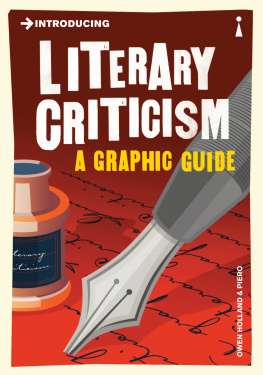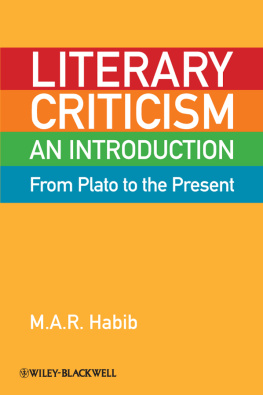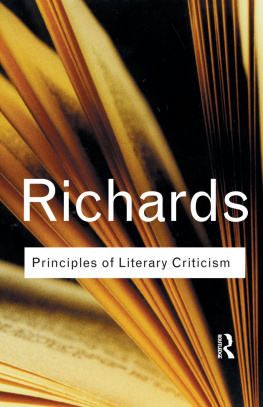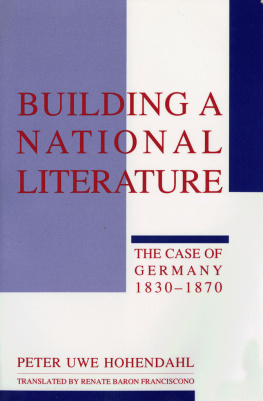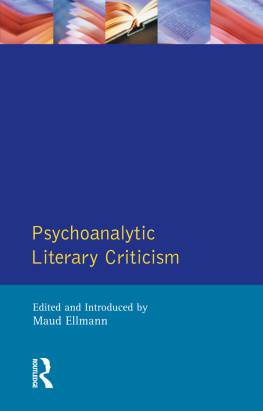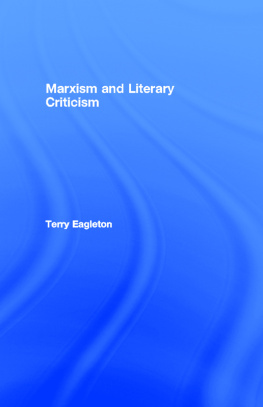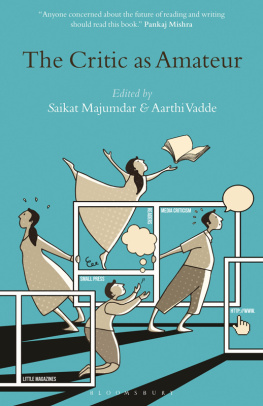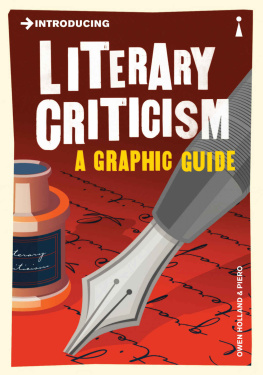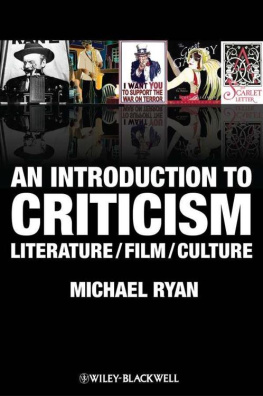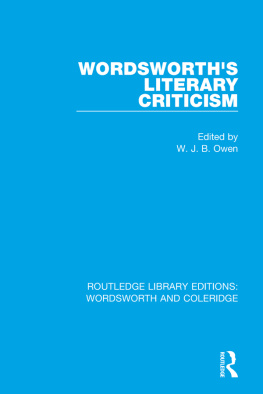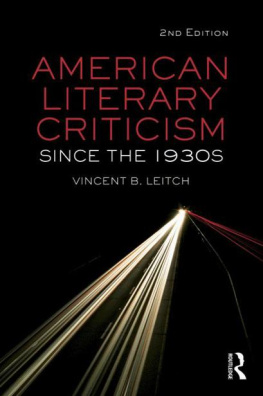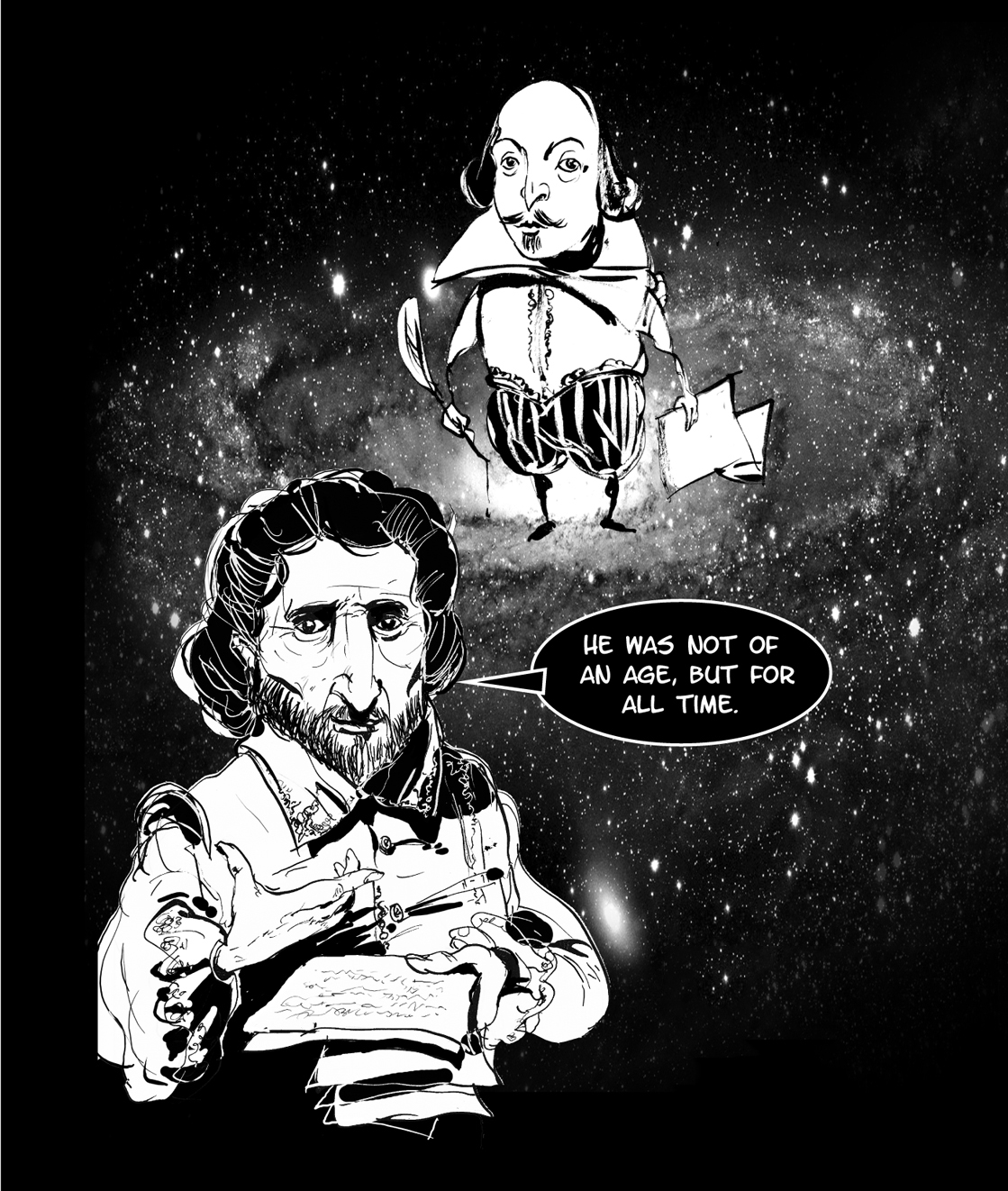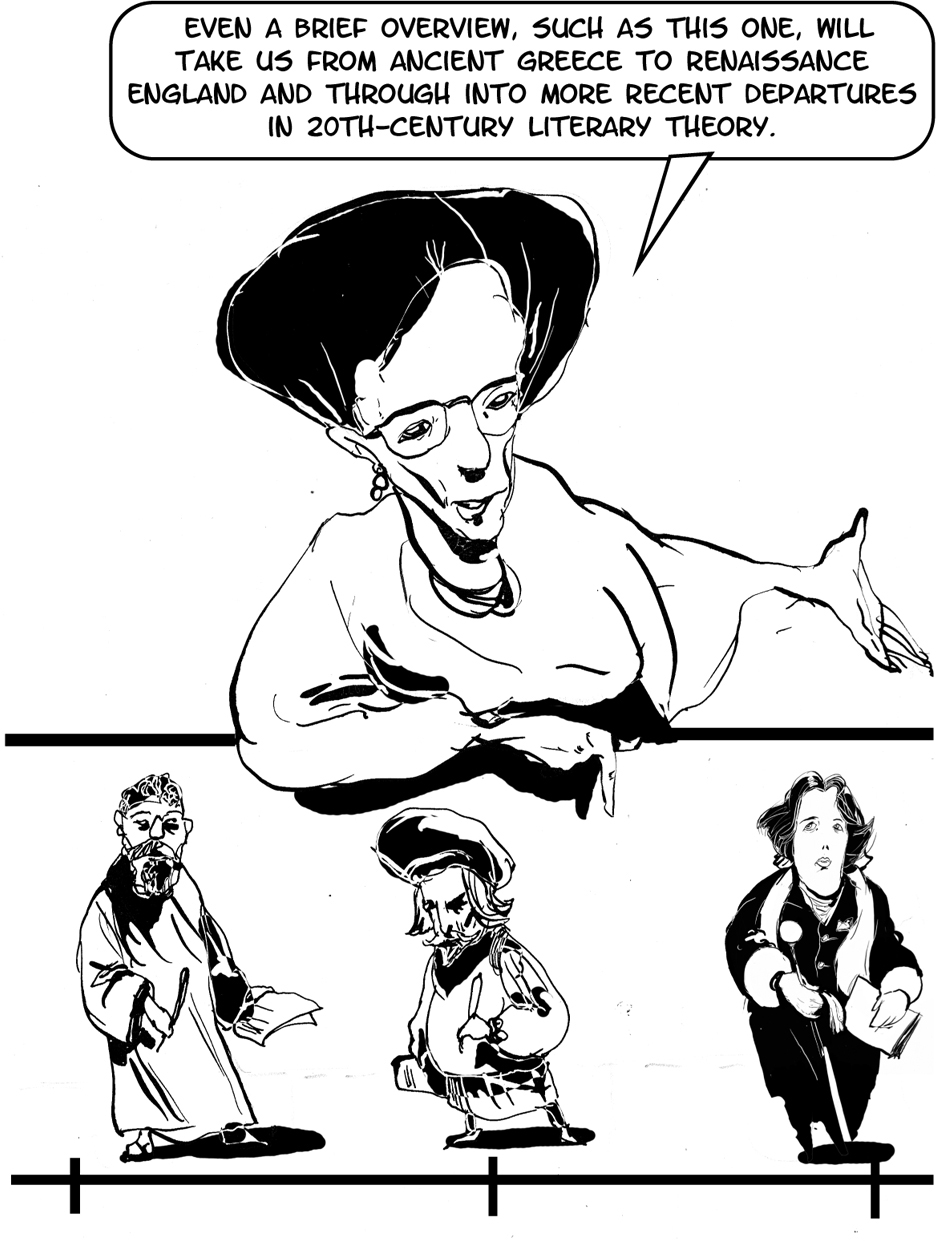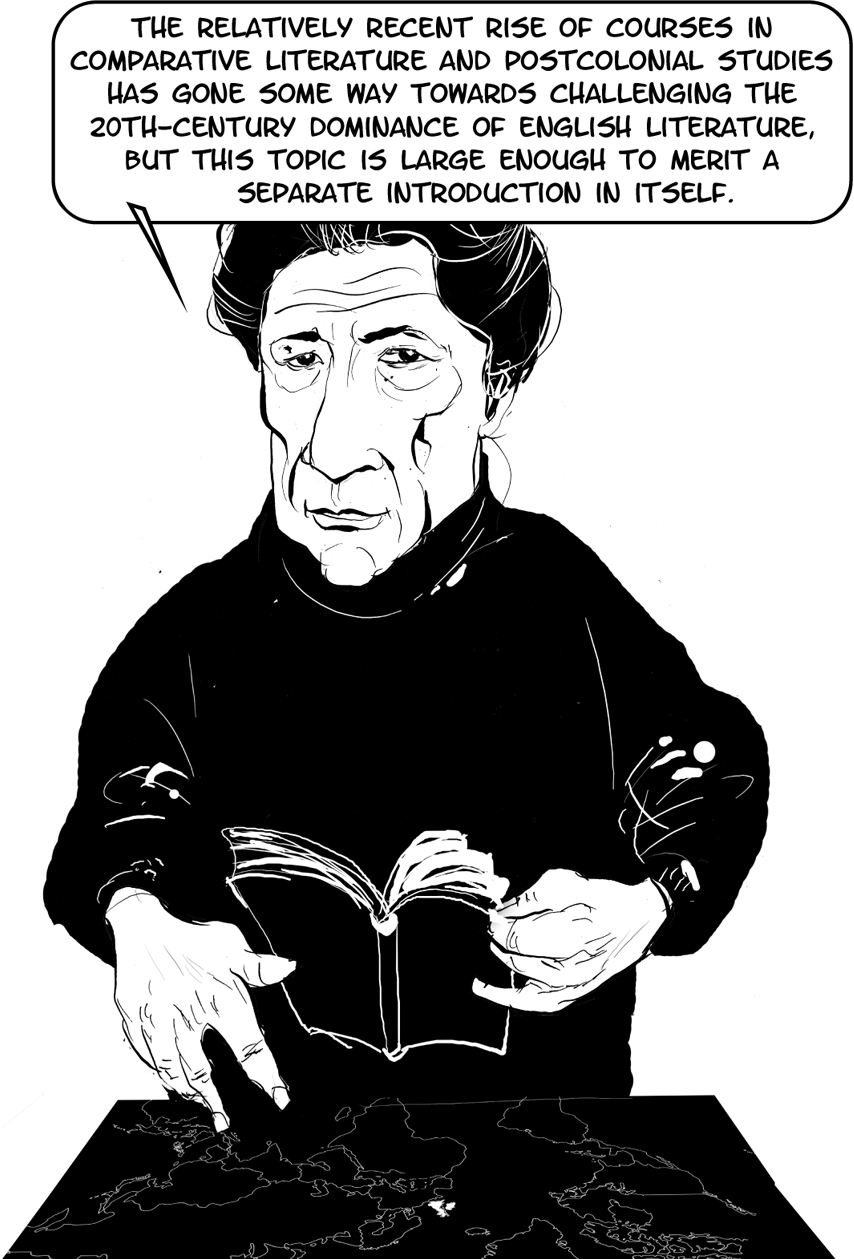Published by Icon Books Ltd, Omnibus Business Centre, 3941 North Road, London N7 9DP
Email:
www.introducingbooks.com
ISBN: 978-184831-905-9
Text copyright 2015 Icon Books Ltd
Illustrations copyright 2015 Icon Books Ltd
The author and illustrator has asserted their moral rights
Originating editor: Kiera Jamison
No part of this book may be reproduced in any form, or by any means, without prior permission in writing from the publisher.
Contents
What Is Literary Criticism?
This is a (short) introduction to literary criticism. It is a book about literary criticism and so, by necessity, it is not a book of literary criticism. Its a truism to say that the literary critics object of study is literature. A book about literary criticism, then, is only indirectly a book about literature. For this reason, thorny questions as to what constitutes literature will have to be left aside at the outset, but it covers: novels, poems and plays, certainly, and much else besides. A literary critic, or a philosopher, might well ask: what is literature?
WHAT IS WRITING? WHY DOES ONE WRITE? FOR WHOM?
The French philosopher, literary critic and communist, Jean-Paul Sartre (190580) asked these very questions in 1947.
Our question is somewhat different: What is literary criticism? We might start with a broad generalization, and say that it includes any writing that claims to make judgements about the value, or otherwise, of literature in general or particular literary works. Arriving at such judgements is likely to entail interpretation (or close reading), comparison and informed analysis. Judgement might also involve claims about the intrinsic worth of literature, the aesthetic* merits and formal qualities of specific works, or their cultural and historical significance.
THOSE WHO POINT TO THE HISTORICAL CONTINGENCY OF LITERARY VALUE MIGHT NOT NECESSARILY AGREE WITH THOSE WHO ASSERT ITS INTRINSIC WORTH.
We will look at questions like this later on.
* Terms marked with an asterisk are explained in the Glossary on .
For All Time?
Ben Jonson (15721637) is best known as a playwright and contemporary of William Shakespeare (15641616). When Jonson said this of Shakespeare:
HE WAS NOT OF AN AGE, BUT FOR ALL TIME.
he made a claim about the universal and trans-historical value of Shakespeares writing.
So far, Jonsons claim has been proved correct: Shakespeares plays are still performed for audiences that span the globe. Jonathan Bate (b. 1958), on the other hand, in his book The Genius of Shakespeare (1998), suggested that the globalization of Shakespeare might have had as much to do with the extension of the British Empire over large parts of the globe in the years after his death.
HAD THE HISTORY OF THE SPANISH EMPIRE TAKEN A DIFFERENT COURSE, PERHAPS LOPE DE VEGA (1562-1635), THE ACCLAIMED PLAYWRIGHT OF THE SPANISH GOLDEN AGE, MIGHT TODAY ENJOY SHAKESPEARES GLOBAL REPUTE.
So, is Shakespeares genius an innate quality of his being, or a matter of contingent and historical construction?
Aesthetics vs Morality
As such questions might suggest, the literary critics object of study is hardly a straightforward matter. For some, such apparently vulgar issues as imperialism and Empire ought not to be wheeled in when considering the specifics of literary value. On this view, questions of aesthetics and questions of morality are best kept separate.
THE SPHERE OF ART AND THE SPHERE OF ETHICS ARE ABSOLUTELY DISTINCT.
But can the words on the page of a given poem or novel really be held in splendid isolation from the texts historical and cultural reception, or its history of publication and translation, or, say, its authors penchant for producing propagandistic radio-broadcasts on behalf of Benito Mussolini, as did the 20th-century modernist poet Ezra Pound (18851972)?
For a literary critic, then, defining ones object, or area, of study can be a contentious issue. Tracing the significance of references to Shakespeare in the novels of Thomas Hardy (18401928) might rank alongside a study of the metrical patterning of Alfred Tennysons (180992) verse in terms of scholarly rigour, but both of these topics might sit oddly next to a critical re-reading of Theodor Adornos (190369) Aesthetic Theory (1970) or an essay* on contemporary avant-garde poetry.
Times in which nature confronts man overpoweringly allow no room for natural beauty; as is well known, agricultural occupations, in which nature as it appears is an immediate object of action, allow little appreciation for landscape.
Such is the scope of the field in its contemporary incarnation as an academic discipline that is taught and studied in universities.
If you cherish aspirations of becoming a literary critic, you could do worse than to start by reading widely in the history of literary criticism. This book is, first and foremost, an introduction to some of the major historical practitioners of literary criticism. Literary criticism has a long history.
Even a brief overview, such as this one, will take us from Ancient Greece to Renaissance England and through into more recent departures in 20th-century literary theory.
There are certain limits to this book. It is a concise survey of a tradition of literary criticism formed in Anglo-Saxon universities in the 19th and 20th centuries, oriented around syllabuses that have tended largely to rely upon certain exclusions: because this book is a survey of that tradition, no space will be made for figures such as Abdallah ibn al-Mutazz (861908) or Lu Xun (18811936), even though both of these writers were highly respected literary critics in their respective cultures.
Edward Said A postcolonial critic well return to on
The relatively recent rise of courses in Comparative Literature and Postcolonial Studies has gone some way towards challenging the 20th-century dominance of English Literature, but this topic is large enough to merit a separate introduction in itself.
Learning through Imitation
Literary criticism is a practice perhaps best learned through imitation. The German philosopher

